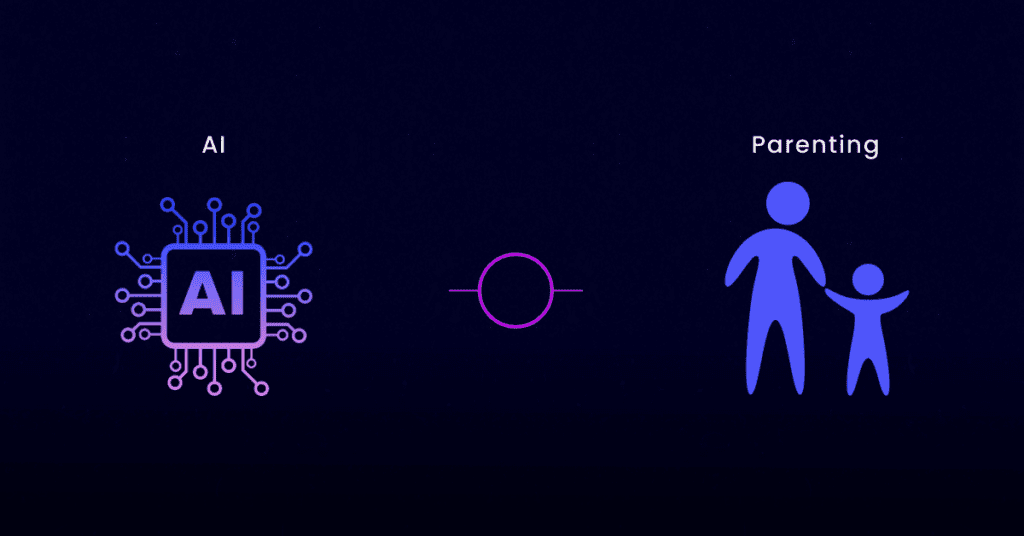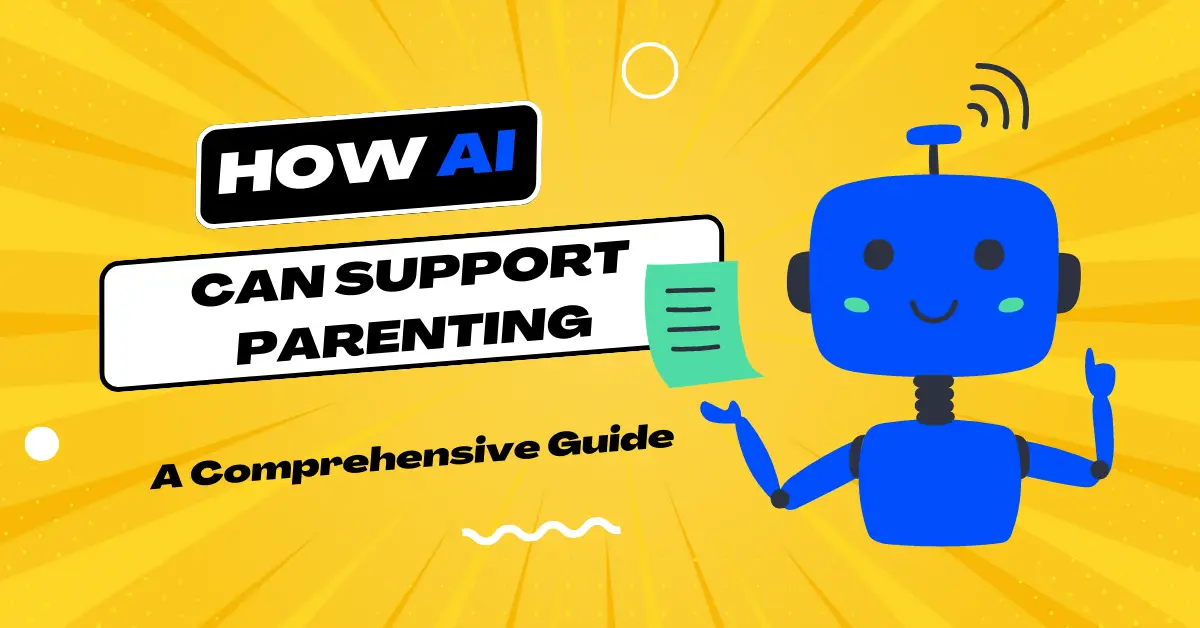Brief Overview of AI
Artificial Intelligence (AI) has increasingly become a pivotal element in today’s world. It involves the development of computer systems that can perform tasks typically requiring human intelligence. These tasks range from interpreting natural language and recognizing patterns to making decisions and learning from experience. AI has permeated many facets of our lives, but can also be used for coming up with entertaining ideas for family night.
How AI Can Be Utilized in Parenting
The realm of parenting is no stranger to the rapid advancement of technology, with AI now playing an increasingly prominent role. In a world where screens are a significant part of daily life, AI offers a unique perspective on how technology can aid parents in raising and educating children. From AI-driven educational platforms that provide personalized learning experiences to smart baby monitors ensuring children’s safety, AI is redefining parenting in unprecedented ways. It can even be used for meal planning, saving your family hours of time and saving you money in the process.
This article aims to explore these intersections and delve into how AI can provide invaluable support to parents. However, it’s essential to note that while AI can offer significant benefits, it also comes with its own set of challenges, which we will address in the later sections. Stay with us as we navigate the exciting world of AI in parenting.
Understanding Artificial Intelligence
Definition of AI
Artificial Intelligence, or AI, is a branch of computer science that focuses on the creation of intelligent machines that can mimic human behaviour, think, learn, problem-solve, and make decisions. The term AI encapsulates a broad range of technologies, including machine learning, where algorithms improve over time, and natural language processing, where machines understand and interact in human language.
Types of AI
AI can be broadly classified into two types: Narrow AI, designed to perform a specific task such as voice recognition, and General AI, which can theoretically perform any intellectual task a human being can do. Currently, most applications of AI in our daily lives are examples of Narrow AI. They excel at the tasks they’re designed for, but their functionality is limited to those tasks alone. However, the future may bring advancements in General AI, broadening the scope of AI’s capabilities.
Current Developments in AI
AI technology has witnessed tremendous growth over the past few years, with continual advancements in machine learning, deep learning, predictive analytics, and cognitive computing. Current developments include AI’s capability to analyze vast amounts of data and generate insights, the use of AI in autonomous vehicles and drones, and AI’s growing ability to understand and generate human language. AI has also made strides in the field of healthcare, from predicting patient health outcomes to enabling precision medicine. These advancements have paved the way for AI’s application in various sectors, including parenting, which is the focus of our discussion.

The Intersection of AI and Parenting
Overview of Parenting Challenges
Parenting in the 21st century presents a unique set of challenges. Parents are tasked with nurturing their children’s development in an ever-changing, increasingly digital world. They must juggle their personal and professional responsibilities while ensuring their child’s physical, mental, and emotional well-being. Concerns about children’s safety, health, education, and the influence of technology on their lives are now more prominent than ever.
Role of Technology in Modern Parenting
Technology has become an integral part of modern parenting. It can be a double-edged sword – while it provides a wealth of resources and opportunities for learning and growth, it also poses new challenges regarding screen time, online safety, and privacy. Parents often find themselves in a delicate balancing act, trying to harness the positive aspects of technology while protecting their children from potential risks.
How AI Comes into the Picture
AI steps into this landscape with the promise of aiding parents in navigating these challenges. Through its ability to learn, adapt, and make decisions, AI can provide personalized, real-time solutions to a range of parenting tasks and concerns. From education and safety to health and household management, AI technologies can assist parents in their everyday lives, adding a new dimension to parenting. By understanding how AI can support them, parents can make more informed choices about integrating these technologies into their family lives.
Applications of AI in Parenting
AI in Education
- Personalized Learning: AI can facilitate personalized learning experiences for children. Intelligent learning systems can track a child’s progress, identify areas of strength and weakness, and adapt content to suit their learning style and pace. This tailoring can enhance the child’s understanding and retention of knowledge, making learning more effective and enjoyable.
- AI Tutors and Interactive Learning Platforms: AI-driven tutoring systems can provide children with one-on-one assistance outside of school hours. These systems use AI algorithms to engage students in interactive lessons, answer questions, and provide feedback, enhancing their learning experience.
AI in Monitoring and Safety
- Baby Monitors: Advanced baby monitors use AI to track a baby’s sleeping patterns, movements, and even breathing. These monitors can alert parents of any abnormal activities, ensuring the baby’s safety and giving parents peace of mind.
- Internet Safety Tools: AI-powered tools can protect children from inappropriate content online. They can also monitor children’s online activities, alerting parents if they encounter potentially harmful situations such as cyberbullying or if they share sensitive information.
AI in Child Health and Wellness
- Nutritional Guidance: AI apps can analyze children’s eating patterns and provide personalized dietary recommendations, ensuring they receive balanced nutrition for healthy growth.
- Mental Health Support: AI chatbots can provide emotional support and help children manage stress, anxiety, or other mental health concerns. These bots use natural language processing to understand and respond to a child’s emotions, providing real-time support.
AI for Developing Skills and Hobbies
- Interactive Games and Apps: AI-powered games and apps can foster skills development in children, from creativity and problem-solving to coding and language skills. These interactive platforms adapt to a child’s skill level and progress, providing an engaging and rewarding learning experience.
- Language Learning AI Tools: AI can enhance language learning by offering personalized lessons, immediate feedback, and interactive practice opportunities. These tools can support language acquisition in a fun, engaging manner.
AI in Household Management
- Smart Home Devices: AI-powered smart home devices can help manage a household efficiently. From setting reminders for parents to automating tasks like lighting or temperature control, these devices can ease the burden of managing a home while raising children.
- Chore and Schedule Management: AI apps can assist parents in organizing household chores and managing family schedules. They can remind children about their tasks and responsibilities, teaching them accountability and helping parents ensure everything gets done.
Ethical Considerations and Parenting
Data Privacy and Security
As AI becomes more integrated into children’s lives, the issue of data privacy and security arises. AI systems often collect and analyze significant amounts of personal data to function effectively. It’s crucial for parents to understand what data is being collected, how it’s used, and how it’s stored. They should choose AI products that comply with the highest standards of data protection, and take proactive steps to protect their children’s digital identities.
Impact on Child’s Independence and Problem-solving Skills
While AI can be an excellent tool to aid in children’s development, there’s a potential risk that children may become overly dependent on these technologies. It’s important for parents to ensure that their use of AI doesn’t inhibit their child’s development of critical thinking and problem-solving skills. Balancing the benefits of AI with opportunities for children to learn and grow independently is a key consideration.
Setting Screen Time Boundaries
With the advent of AI-driven educational platforms, games, and tools, children may end up spending excessive time in front of screens. Parents need to set and enforce healthy screen time boundaries, ensuring that children also engage in physical activities and social interactions that are critical for their overall development.
DAI and Social Interactions
AI tools can sometimes replace human interaction, which can have implications on a child’s social skills development. Parents should ensure that their child interacts with AI supplements, rather than replaces, real-world social interactions. Time spent with family, friends, and peers is crucial for children to develop empathy, emotional intelligence, and other key social skills.
Potential Future Developments in AI Parenting
Predictions for AI in Parenting
The application of AI in parenting is only in its nascent stages. Future advancements may see a rise in AI applications that further support parents in their roles. These could include advanced AI systems that monitor a child’s emotional and psychological well-being, AI-driven therapies for children with special needs, or AI tools that aid in complex tasks like college planning and career guidance. The future of AI in parenting looks promising, with technology progressively becoming a more effective parenting aide.
Potential Benefits and Challenges
While the future promises numerous potential benefits of AI in parenting, it also poses its share of challenges. Issues like data security, technology addiction, and the potential impact on the human touch in parenting may become more prominent. The key lies in finding a balance, using AI as a tool to enhance parenting without letting it replace the fundamental human elements that make parenting unique and irreplaceable.
Final Thoughts of the Impact of AI on Parenting
The intersection of AI and parenting opens up a myriad of opportunities and challenges. AI can be a powerful tool for parents, providing support in areas like education, safety, health, and household management. However, like all powerful tools, it must be used wisely and responsibly, considering the implications on children’s data privacy, independence, and social interactions. Parents must talk to children about AI and teach them the proper and appropriate uses of this powerful new technology.
As AI continues to evolve and become more integrated into our lives, parental involvement in children’s use of AI becomes even more crucial. By understanding AI, staying updated with its advancements, and guiding their children in its responsible use, parents can harness the full potential of AI to enrich their children’s lives and support their parenting journey. In the end, technology is just a tool; the key to successful parenting lies in the loving, understanding, and guiding hands of parents.

